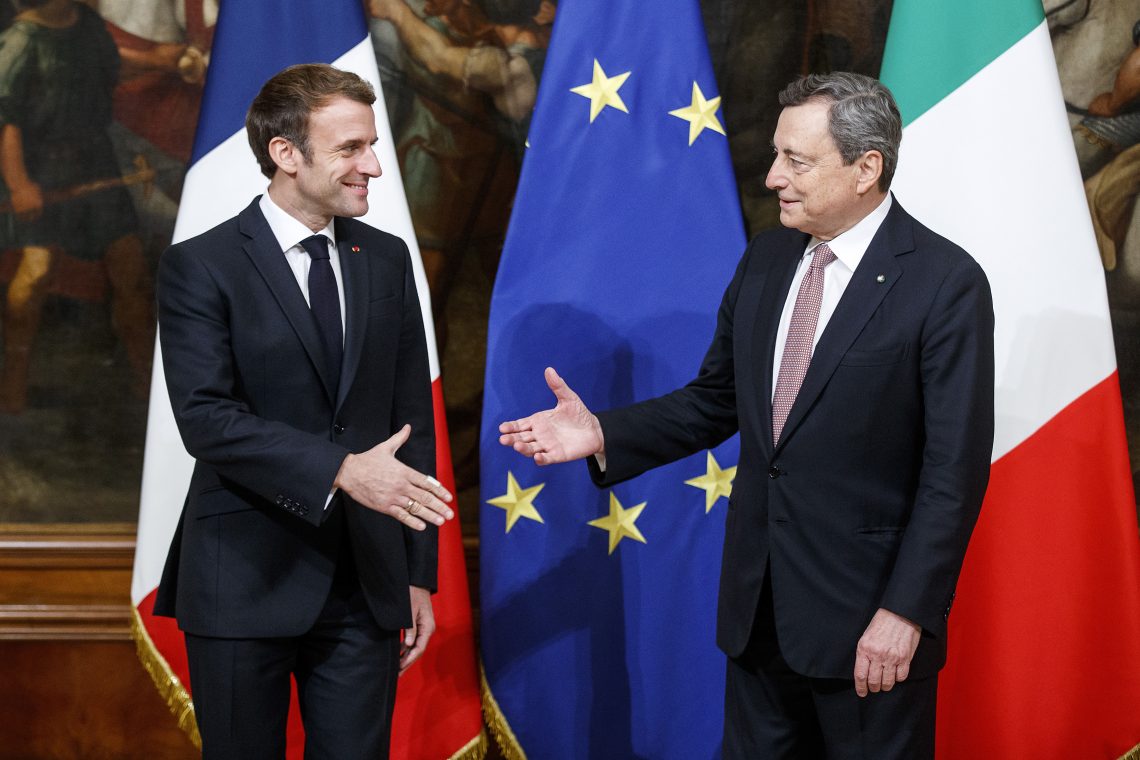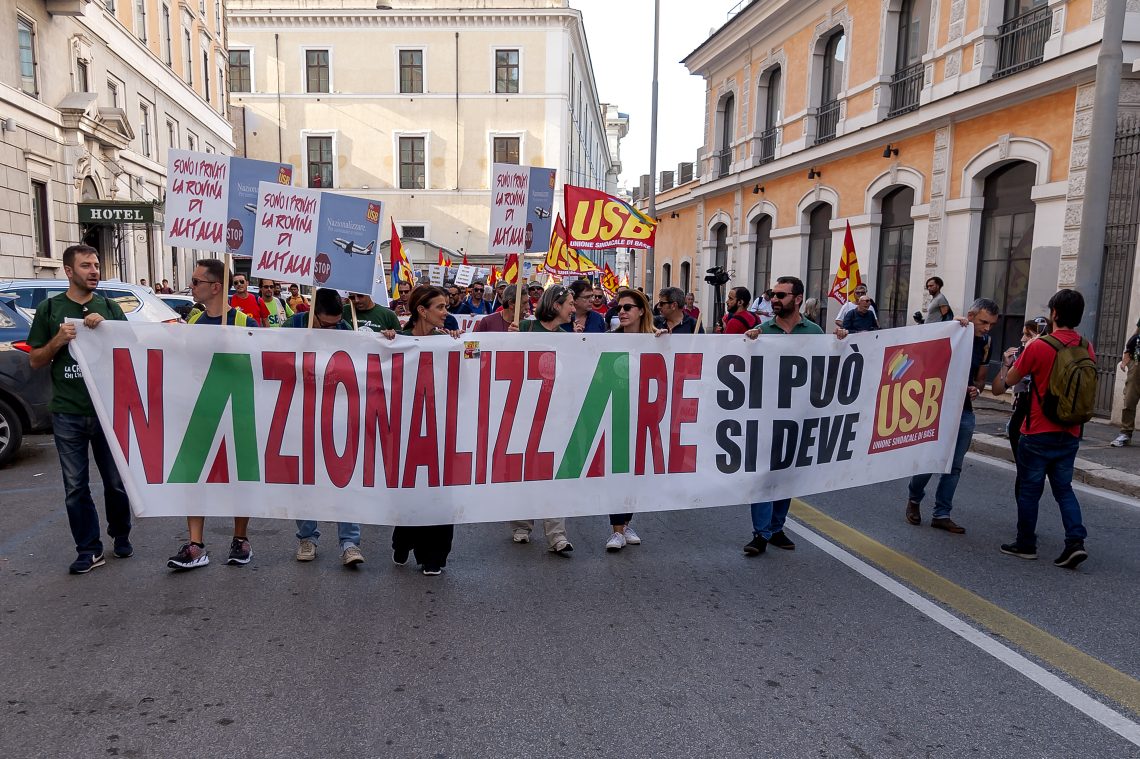A new chapter for France and Italy
With a new bilateral treaty to foster French-Italian cooperation, Emmanuel Macron and Mario Draghi are signaling an interest in revamping the EU’s fiscal rules.

In a nutshell
- The Quirinal Treaty marks a new alliance for France and Italy
- Macron and Draghi have common interests on public finance
- They will face headwinds from other EU countries
In November 2021, French President Emmanuel Macron and Italian Prime Minister Mario Draghi signed an “enhanced cooperation treaty” at the Quirinal Palace, the residence of the head of state in Rome. Beyond the agreement’s specifics, the two parties find themselves with many common issues around which to deepen their partnership. Public finance, in particular – despite not being a subject of the document – is obvious grounds for a new alliance.
The arrival of Mario Draghi at the helm of the Italian government certainly set a different tone to the French-Italian relationship. Mr. Draghi is supported by a heterogenous coalition including the Democratic Party, Silvio Berlusconi’s Forza Italia, the Five Star Movement (M5S) and Lega.
The Democratic Party has been consistently Francophile over the years. Mr. Berlusconi – who used to sing French songs and talk of time spent at the Sorbonne during his university years – had a difficult time in France in the 1980s, as the owner of La Cinq TV company, and an uneasy relationship as prime minister with French Presidents Jacques Chirac and Nicolas Sarkozy. More recently, the French media conglomerate Vivendi became an unwelcome shareholder of Mr. Berlusconi’s Mediaset. Meanwhile, Lega is a populist party that has often polemicized against President Macron, blaming the French for not cooperating on the issue of immigration. Luigi Di Maio, the erstwhile leader of the M5S and now Italy’s Minister of Foreign Affairs, has openly sympathized with the anti-Macron Yellow Vest movement.
Treaty commitments
Mr. Draghi, for his part, is cut from the same cloth as his French peer. The two have known each other since the Italian prime minister’s tenure at the European Central Bank, and are leaders similarly legitimized by their competence and technocratic allure.
First announced in 2017, the Quirinal Treaty aims at “coordination of the two countries in matters of European and foreign policy, security and defense, migration policy, economy, education, research, culture and cross-border cooperation.” It allows for “a stable mechanism of enhanced consultation, both at the political and senior official level, particularly in case of crises or at the eve of significant deadlines.” Yet it is not an alternative to the system of multilateral relationships that include the two countries, and to which they stress their allegiance: the EU and NATO.
The treaty’s good intentions can be summed up in the willingness (and possibly the means) to share information, in the wake of some of the most pressing challenges of our times. On defense and military capacity, the treaty shows a commitment to cooperate in the development of their national industries, in the context of a “European strategic culture.”
The pandemic has sharply increased public spending and the debt in both France and Italy.
Other goals are less clear. Both countries, for example, claim to favor “decarbonization,” but it is difficult to see how more dialogue between French and Italian transport ministers can produce a substantive push in that direction. In some areas, like agriculture and food production, the impression is that simply committing to achieve common goals – however vaguely expressed – can engineer a common position with substantial weight in Brussels.
The drums of growing “cooperation” are beaten throughout the treaty. Ministers are directed to interact and develop technical agreements and intergovernmental relationships dealing with a number of issues, from culture to immigration. But the peak of this cooperative spirit is perhaps represented by plans for a yearly intergovernmental summit, meant to somehow test the progress of its goals. One curious device is that every three months, one minister of the French government will participate in the meetings of the Italian council of ministers, and vice versa.
The role of government
On economic matters, the Quirinal Treaty presents a commitment to a European “industrial policy oriented to the global competitiveness of business and to accomplish the double transition, digital and environmental, of the European economy.” Besides the token nod to start-up companies and proposals to help smaller businesses to compete for European grants, the document shows a certain understanding of the common challenges facing the French and Italian economies.
This is perhaps truer now than it used to be. France, the country of the grandes ecoles, is understandably proud of her technocracy. While the country is home to a substantial number of sizable private companies, the government has always been the central actor – either as the owner of some of the most important French businesses, or as guardian and caretaker of the development of private businesses. Competition has always been “managed” and corporatist.
Italy has had similar ambitions but a different history. The system of government-owned companies was discredited in the early 1990s, when allegations of corruption submerged the political class and showed how politicians appointed managers in government-run companies simply to benefit their respective parties. In the 1990s, when a younger Mario Draghi was director general of the Treasury Ministry, Italy heavily privatized: selling banks and insurance companies, allowing private investors in its energy and gas companies and putting its telecom incumbent and highways on the market.

Still, this was all largely thanks to financial constraints and the need to fix the government balance sheet, rather than genuine political commitment.
In recent years the trend has been reversed. Back in 2017, the Italian government bank acquired a stake in TIM, the telecom incumbent. The state is now back in the insurance business, thanks to Poste Italiane. Most recently, after the pandemic, the government renationalized Autostrade, which managed most of the Italian highways under a government concession – a decision taken by the left-of-center coalition of Giuseppe Conte but implemented by the one led by Mario Draghi.
This growing role of the government in the economy appears to many to be justified by the supposed lack of resilience of small businesses, once the pride of the Italian economy. Hence, the idea – hardly contested on either the right or the left – that the future of Italy entails a stronger role for the visible hand of the state.
Fiscal framework
When it comes to public finance, the two countries evidently share a common interest. Mr. Macron and Mr. Draghi authored a December 23 joint op-ed in the Financial Times, outlining some common demands for the reform of EU fiscal rules.
The pandemic has sharply increased public spending and the debt in both countries: in France from less than 98 percent of gross domestic product (GDP) to 116 percent, and in Italy from 135 percent to 162 percent of GDP. The relaxing of European rules made possible increased public spending, and European institutions went further down the road of “solidarity” by mutualizing debt for the first time, with the so-called NextGenerationEU plan. For France and Italy, both high public spending countries, retrenchment will be difficult.
Accordingly, the French and Italian leaders are signaling their willingness to be at the forefront of budget rules reform. They promise a strategy “to curb recurrent public spending through sensible structural reforms.” But they emphasize that the new normal is not going to be fiscally restrained: “just as the rules could not be allowed to stand in the way of our response to the pandemic, so they should not prevent us from making all the necessary investments.”
France and Italy are betting their future on a “new fiscal framework.” In this regard, Mr. Draghi’s signature is a plus for Emmanuel Macron: while the former may be the prime minister of a fiscally weak country, he is also the onetime central banker who steered the ECB out of the European debt crisis.
In the Macron-Draghi op-ed, it is particularly telling to find the argument that “prior to the pandemic, the EU’s existing fiscal rules were already in need of reform. They are too obscure and excessively complex. They constrained the actions of governments during crises and overburdened monetary policy. They also failed to provide incentives for prioritizing key public spending for the future and for our sovereignty, including public investment.” This sounds like an indictment of the very principles of fiscal responsibility that underpinned the first 20 years of the euro.
Scenarios
On fiscal responsibility, the two may have to challenge other EU countries, particularly German and the Nordic states, that have a different approach and that will not be enthusiastic for laxer public finance by Mediterranean member states. In this regard, President Macron is playing with better cards than Prime Minister Draghi.
By outlining a proposal for reforming fiscal rules, Italy is confirming what other member states think about its weaknesses. In a sense, it is placing itself at one extreme of the future debate on the new fiscal rules after Covid-19. Mr. Macron is a cosigner of the op-ed, but has a better public finance situation and may enjoy the luxury of negotiating a middle position, mediating between Mediterranean countries and Germany and the Nordics.








